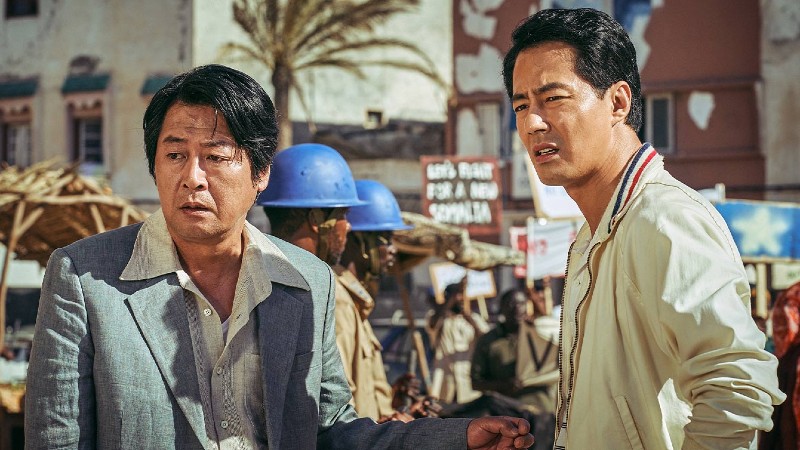




It’s 1991, Somalia. Ravaged by an-ongoing conflict, the streets of Mogadishu make for bleak viewing. When empty, they’re completely derelict, scorched harshly by the sun and, at times, blood stained. When full of life, it’s morbid, with two sides continuously violently at odds with each other, the intrinsic value of life washed away by the motivation to either overthrow or keep intact the ruling of President Siad Barre.
Such is the gritty yet enrapturing backdrop of Ryoo Seung-wan’s latest blockbuster, the aptly titled Escape From Mogadishu which focuses on the dramatised true story alliance of the two Koreas looking to, well, do exactly what it says on the tin (the film title).
Of course, it’s no easy task, and we’re made privy to the strained inter-Korean relations throughout the first act of the film. From blocking presidential meetings to controlling media narratives, neither the North or South plan on allowing any ground gained, with the two embroiled in what appears to be no more than petty one upmanship. That is until civil war breaks out; a sharp, rapidly unravelling moment which sees the suave smarminess of the nations in a somewhat comedic scene quickly give way to an anxious desperation to flee a city (and country) being brought to its very knees.

It’s from this point the release truly starts to find its feet, with the darkened shots of cut-off embassies and somewhat fragmented decor the ideal supplement to a thriller which remains willingly confident. Jo In-sung is excellent as intelligence agent Kang Dae-jin, an unmoving airhead who schemes and shouts his way through the ongoing conflicts, whilst Heo Joon-ho gives his depiction of North Korean ambassador Rim Yong-soo a seemingly unbreakable nerve, duly armed with a near permanently intimidating gaze. Elsewhere, Kim Yoon-seok delivers the expected dependability in his leading role, and rising star Koo Kyo-hwan ensures that the character of Tae Joon-gi remains rooted in distrust of his South Korean counterparts, but somewhat investable as a temerarious pseudo-protagonist towards the apex of proceedings.
But, for all the political bells and whistles, and some sharply placed comedy which breaks up a bristling intensity, it’s the Hollywood-esque car chase which stands out as the most adept part of the viewing experience. Here, the methodical plotting and slow-moving pondering is swiftly replaced with rapid breathlessness, and a simplistic question: will the group make it out alive? Viewers may be equipped to answer it upon knowing the real life context, or simply because they know the general formula of a blockbuster, but it’s nonetheless gripping stuff, especially considering the newfound level of trust between the two Koreas.
Less idealistic than the likes of‘Steel Rain (Yang Woo-suk, 2017), and much more subtle than your average run-of-the-mill cinema hit, Escape From Mogadishu is a crowd-pleasing, rousing effort from director Ryoo Seung-wan, a man not exactly unfamiliar to producing them. It’s South Korea’s 2022 Oscar entry for Best International Feature, and if the reaction of the London audience on Thursday night is anything to go by, it may just stand a good chance of winning.
Escape from Mogadishu showed at the London Korean Film Festival, when this piece was originally written. In cinemas Friday, March 25th. On all major VoD platforms on Monday, April 11th.
















